
Every complete sentence has two fundamental components: the subject and the predicate.
If you want to improve your writing, you may need to understand how to isolate each of these components. That way, you can avoid grammatical mistakes such as mixed constructions or putting commas in the wrong places.
So what is a predicate? The simplest answer is that the predicate is the part of a sentence that contains the verb.
Read on to learn about the different types of predicates and how to use them.
- What Is a Predicate?
- What’s the Difference Between a Simple Predicate and a Compound Predicate?
- What’s the Difference Between an Action Verb, a Predicate Adjective, and a Predicate Noun?
- How Do You Find the Verb Phrase in a Sentence?
- What Are Some Examples of Predicates?
- Are You Using Predicates Correctly?
What Is a Predicate?
The predicate is the part of a sentence or clause that tells us what the subject is or what it does.
The subject describes who is performing the action in the sentence, while the predicate describes the action performed.
The predicate always contains a verb, but it often includes more words than just the verb itself.
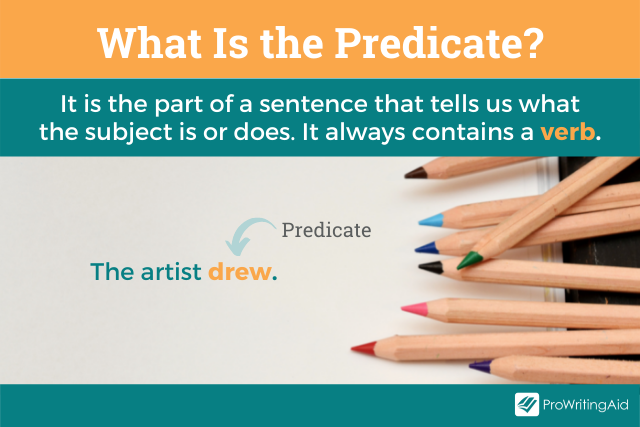
For example, in the sentence “The athlete ran,” the predicate is “ran” because it tells us what the athlete did.
In the sentence “The athlete ran across the field,” the predicate is “ran across the field” because that entire group of words describes the action being performed.
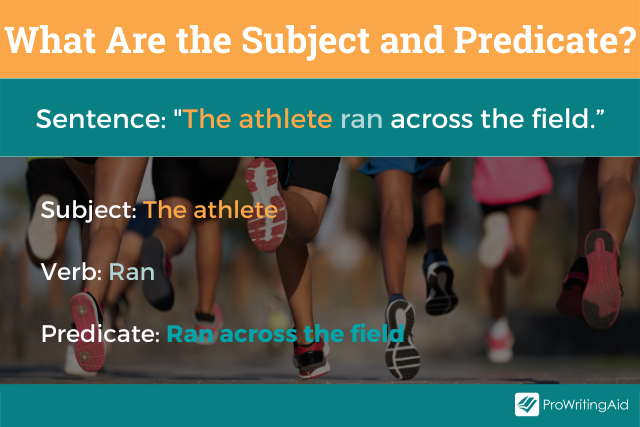
Every clause needs a predicate, whether it’s an independent clause or a dependent clause.
Here are some examples of predicates in independent clauses:
- Hera is a hungry hippo (the subject is “Hera”)
- She wears a long skirt (the subject is “she”)
- He has a raucous laugh (the subject is “he”)
Here are some examples of predicates in dependent clauses:
- … who loves apple pie (the subject is “who”)
- … that flutters in the wind (the subject is “that”)
- … which sounds louder than a blender (the subject is “which”)
It can be tricky to find the predicate in a dependent clause, because the independent clause will have its own predicate as well. In complex sentences, you might have more than one predicate on your hands.
Take a look at the following examples:
- Hera is a hungry hippo who loves apple pie.
- She wears a long skirt that flutters in the wind.
- He has a raucous laugh, which sounds louder than a blender.
What’s the Difference Between a Simple Predicate and a Compound Predicate?
Predicates are often divided into simple predicates and compound predicates.
A simple predicate tells us just one thing about a subject.
- Paul lives on a desert planet.
- Paul practices the Weirding Way.
A compound predicate tells us multiple things about the same subject, without repeating the subject in the sentence.
- Paul lives on a desert planet and practices the Weirding Way.
- Paul lives on a desert planet, practices the Weirding Way, and hangs out with Chani.
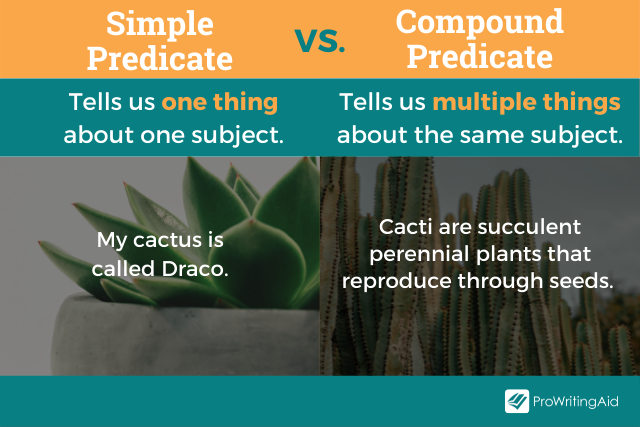
Remember that compound predicates don’t repeat the subject of the sentence. That would just be multiple clauses with simple predicates, attached together.
Here are some examples of multiple clauses with simple predicates:
- Paul lives on a desert planet and he practices the Weirding Way.
- Paul lives on a desert planet, where he hangs out with Chani.
In both of the above examples, we have two simple predicates, one with the subject “Paul” and one with the subject “he.” These are not complex predicates, because the subject is repeated.
What’s the Difference Between an Action Verb, a Predicate Adjective, and a Predicate Noun?
Predicates can either describe an action that the subject is performing, or a state of being that the subject is experiencing.
Action Verbs
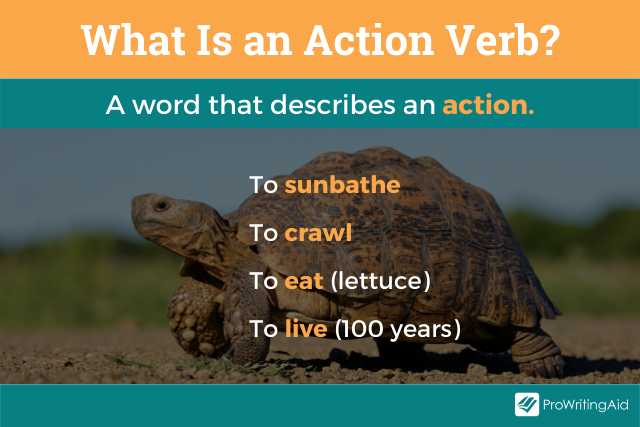
If the predicate verb is an action verb, such as “to run” or “to bake” or “to paint,” the predicate describes an action.
Linking Verbs
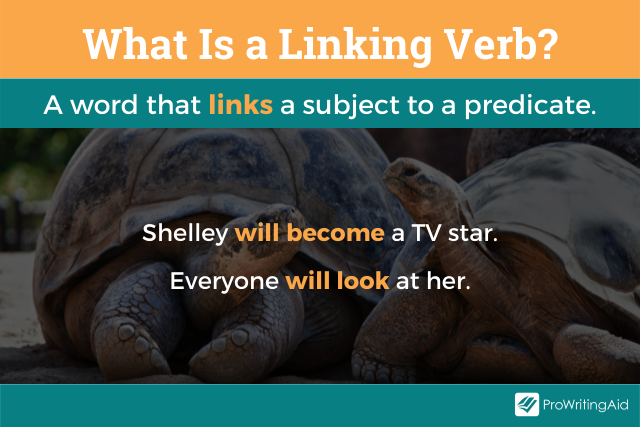
On the other hand, if the verb is a linking verb, the predicate describes a state of being.
A linking verb is either a status verb, which describes the way something is or will be (e.g. “to be,” “to become,” “to appear”) or a sense verb, which describes one of the five senses (e.g. “to look,” “to taste,” “to feel”).
There are two types of predicates that can come after a linking verb: predicate adjectives, and predicate nouns.
Predicate Adjectives
A predicate adjective is an adjective that describes the subject of a linking verb.
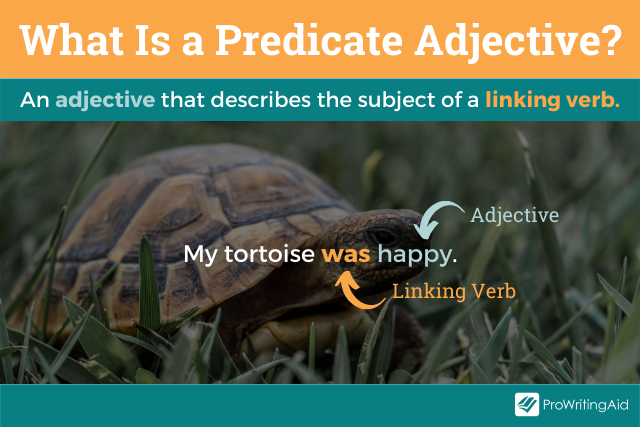
Examples of predicate adjectives:
- My mother was angry. (The linking verb is “was”)
- I felt afraid. (The linking verb is “felt”)
- Good for you, you look happy and healthy. (The linking verb is “look”)
Predicate Nouns
A predicate noun (also called a “predicate nominative”) is a noun or pronoun that describes the subject of a linking verb.
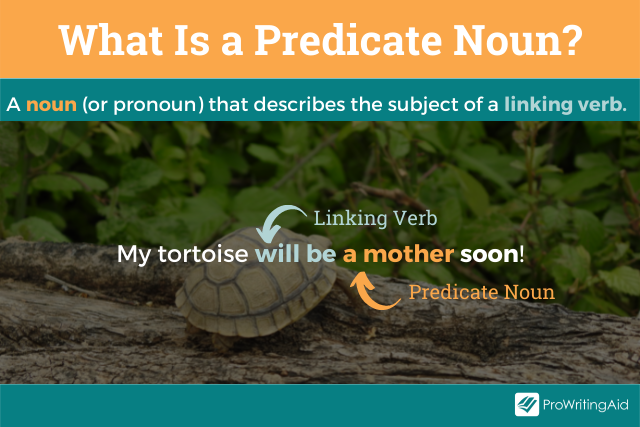
Examples of predicate nouns:
- My mother was a formidable woman. (The linking verb is “was”)
- I felt a wave of fear. (The linking verb is “felt”)
- I will be your friend, but not your girlfriend. (The linking verb is “will be”)
How Do You Find the Verb Phrase in a Sentence?
At the heart of every predicate is a verb. So if you want to find the predicate of a sentence, you need to look for the verb.
The predicate consists of not only the verb itself, but also all of the objects and modifiers attached to it.
Another thing to remember is that the verb doesn’t always come after the subject of the sentence. When you put the verb first, you create something called an inverted sentence, which can be an interesting stylistic choice.
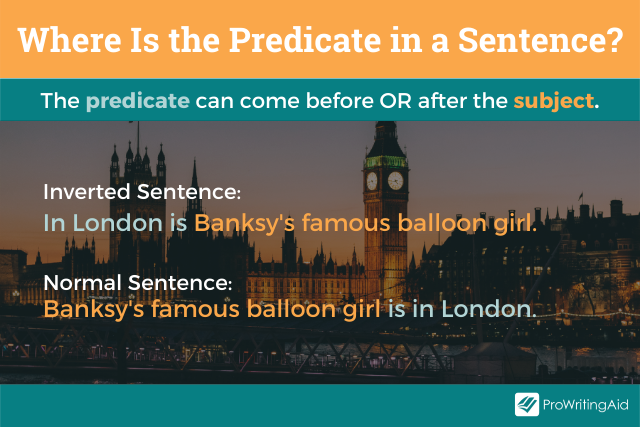
For example, you could say Here lived the old woman with seven cats or The old woman with seven cats lived here. The subject is “the old woman with seven cats” and the predicate is “lived here” (or “here lived”). Both sentences are grammatically correct, even though they put the subject and the predicate in different orders.
What Are Some Examples of Predicates?
Let’s look at some examples of sentences from literature.
“Clara’s death completely transformed life in the big house on the corner.”—The House of the Spirits, Isabel Allende
- The subject: Clara’s death
- The predicate: completely transformed life in the big house on the corner
- Type of predicate: simple predicate, action verb
“The sound was pure and sweet as water, bright as lemons.”—The Song of Achilles by Madeline Miller
- The subject: The sound
- The predicate: was pure and sweet as water, bright as lemons
- Type of predicate: compound predicate, predicate adjective
“Excitement is tinged with a hint of sorrow, like the first stroke of the paintbrush on a fresh sheet of paper.”—The Hidden Girl and Other Stories by Ken Liu
- The subject: Excitement
- The predicate: is tinged with a hint of sorrow, like the first stroke of the paintbrush on a sheet of paper
- Type of predicate: simple predicate, predicate adjective
“In the land of the blind, the one-eyed man would adjust, or otherwise be deemed a lunatic or a heretic.”—The Office of Historical Corrections by Danielle Evans
- The subject: The one-eyed man
- The predicate: would adjust, or otherwise be deemed a heretic
- Type of predicate: compound predicate, action verb
“I’m trying to concentrate, but my brain feels like a rock skipping over water.”—My Dark Vanessa by Kate Elizabeth Russell
- The subject of the first clause: I
- The predicate of the first clause: am trying to concentrate
- Type of predicate: simple predicate, predicate adjective
- The subject of the second clause: my brain
- The predicate of the second clause: feels like a rock skipping over water
- Type of predicate: simple predicate, predicate noun
“When you’re a child you long to be an adult and decide everything for yourself, but when you’re an adult you realize that’s the worst part of it.”—Anxious People by Fredrik Backman
- The subject of the first clause: you
- The predicate of the first clause: long to be an adult and decide everything for yourself
- Type of predicate: compound predicate, action verb
- The subject of the second clause: you
- The predicate of the second clause: realize that’s the worst part of it
- Type of predicate: simple predicate, action verb
Are You Using Predicates Correctly?
Have you ever heard of subject-verb agreement? It's not as complex as it sounds.
The verb in your predicate has to match the subject of your sentence in number. For example, Hera is a hungry hippo who love apple pie is incorrect, because the verb love doesn't match the singular subject, Hera.
However, if we write Hippos love apple pie, then love is the correct choice because the subject (hippos) is plural.
If you're unsure whether your subjects and verbs agree, use ProWritingAid:

Sign up for a free ProWritingAid account.
Was this article helpful? Let us know in the comments.


